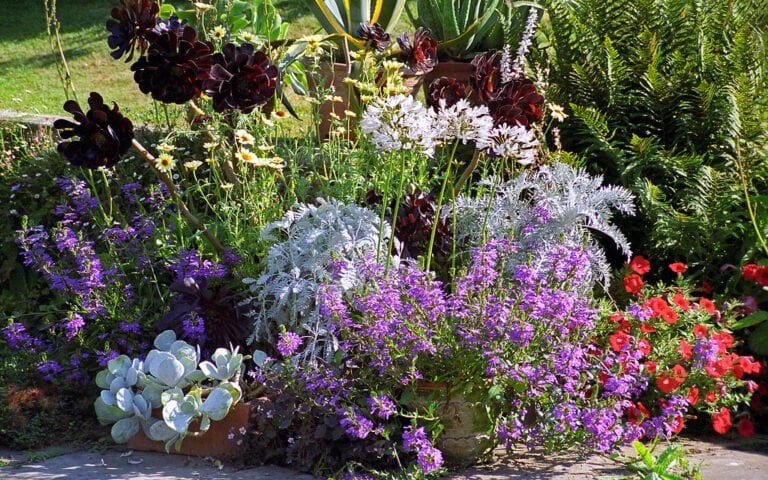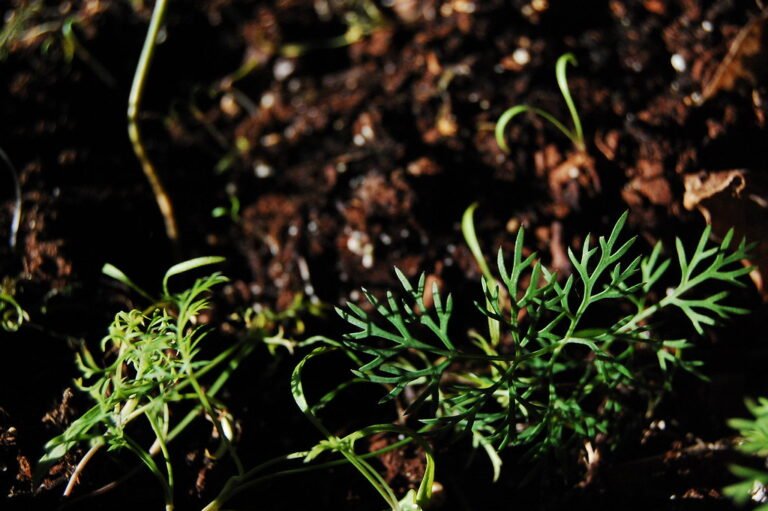Understanding the Benefits of Companion Planting With Lavender
Are you looking to enhance your garden's beauty while also improving its overall health? Look no further than companion planting with lavender. By strategically pairing this fragrant herb with other plants, you can reap a multitude of benefits. From deterring pests and attracting beneficial insects to promoting pollination and reducing stress for nearby plants, lavender is a versatile addition to any garden. Discover the amazing advantages of companion planting with lavender and take your gardening to new heights.
Soil Improvement
Improve your soil by planting lavender as a companion. Lavender is not only a beautiful and fragrant addition to your garden, but it also has numerous benefits for your soil. When planted alongside other plants, lavender acts as a natural pest repellent, deterring harmful insects and pests from attacking your crops. Additionally, lavender has deep roots that help improve soil structure and drainage, preventing waterlogging and promoting better nutrient absorption for your plants. The roots also contribute to soil aeration, which is essential for the health of your plants' root systems. Lavender also attracts beneficial pollinators like bees and butterflies, which can increase the yield of nearby crops. By planting lavender as a companion, you can enhance your soil's health and create a thriving garden ecosystem.
Pest Control
To effectively control pests in your garden, companion planting with lavender offers a natural and efficient solution. Lavender is known for its strong aroma, which acts as a natural deterrent for many pests. Planting lavender alongside other plants can help repel pests such as aphids, ants, and mosquitoes. The strong scent of lavender masks the scent of other plants, making it difficult for pests to locate their desired hosts. Additionally, lavender attracts beneficial insects like bees and butterflies, which can help control pest populations by preying on them. To maximize the pest control benefits of lavender, plant it strategically throughout your garden, especially near plants that are prone to pest infestations. Regularly trimming the lavender plants will release more of their fragrance, increasing their efficacy in repelling pests. By companion planting with lavender, you can naturally and effectively control pests in your garden while enjoying the beauty and fragrance of this versatile plant.
Attracting Beneficial Insects
To continue with the discussion on pest control, companion planting with lavender also helps in attracting beneficial insects. Beneficial insects play a crucial role in maintaining a healthy garden by preying on pests that can damage your plants. Lavender is known to attract a variety of beneficial insects, including bees, butterflies, and ladybugs. Bees are essential for pollination, ensuring the reproduction of your plants and the growth of fruits and vegetables. Butterflies add beauty to your garden while also helping with pollination. Ladybugs are voracious predators of aphids, mites, and other harmful insects. By planting lavender alongside your other crops, you create a welcoming habitat for these beneficial insects, increasing biodiversity and reducing the need for chemical pesticides. This natural pest control method not only benefits your garden but also supports the overall health of the ecosystem.
Enhancing Fragrance in the Garden
How can lavender enhance the fragrance in your garden? Lavender is known for its delightful fragrance, which can add a touch of serenity and beauty to any garden. By planting lavender in your garden, you can enhance the overall fragrance and create a calming and inviting atmosphere. The aromatic oils in lavender flowers release a pleasant scent that can help mask unpleasant odors and create a soothing environment. To maximize the fragrance in your garden, plant lavender in areas where you spend the most time, such as near seating areas or paths. Additionally, pruning the lavender regularly will promote more flowers and therefore increase the fragrance. Harvesting the flowers and using them in potpourri or sachets can also bring the wonderful aroma of lavender indoors.
Promoting Pollination
Lavender can attract pollinators to your garden, benefiting the overall health and productivity of your plants. Pollinators such as bees, butterflies, and hummingbirds are essential for the reproduction of many plants. By planting lavender alongside your other crops or flowers, you can create a favorable environment for these pollinators to thrive.
The vibrant purple flowers of lavender produce nectar and pollen, which serve as a valuable food source for pollinators. These creatures are naturally attracted to the sweet scent and bright colors of lavender, making it an ideal companion plant. As they visit the lavender blooms, they inadvertently transfer pollen from one plant to another, promoting cross-pollination and enhancing the fruit set of nearby crops.
Additionally, the presence of pollinators in your garden can help increase the overall biodiversity and ecological balance. By providing a habitat that attracts these beneficial insects, you are not only serving your plants but also contributing to the conservation of these important species. So, consider adding lavender to your garden to promote pollination and create a thriving ecosystem.
Natural Weed Suppression
Planting lavender as a companion in your garden can significantly reduce weed growth. Lavender has natural weed-suppressing properties that can help keep your garden beds clean and free from unwanted vegetation. The strong fragrance of lavender acts as a natural deterrent, discouraging weeds from taking root and spreading. Additionally, the dense foliage of lavender plants creates a physical barrier that shades the soil, making it difficult for weed seeds to germinate and grow. By planting lavender strategically throughout your garden, you can create a natural weed barrier that not only adds beauty and fragrance but also reduces the need for manual weeding and the use of chemical herbicides. It's a practical and eco-friendly way to maintain a weed-free garden.
Companion Planting With Vegetables
To maximize the benefits of companion planting, incorporate lavender with your vegetable crops. Lavender not only adds beauty to your garden, but it also plays a crucial role in promoting healthy growth and repelling pests. When planted alongside vegetables, lavender acts as a natural pest deterrent, keeping harmful insects at bay. Its strong fragrance confuses pests and prevents them from finding your vegetable plants. Additionally, lavender attracts beneficial insects like bees and butterflies, which help with pollination. This enables your vegetable crops to produce higher yields. Lavender also improves the overall health of your garden soil by attracting earthworms and improving drainage. So, whether you're growing tomatoes, peppers, or cucumbers, don't forget to include lavender as a companion plant to enhance the growth and productivity of your vegetable crops.
Deterrent for Deer and Rabbits
If you are looking to protect your garden from deer and rabbits, incorporating lavender as a companion plant can be an effective deterrent. Lavender has a strong scent that acts as a natural repellent for these animals. The strong fragrance of lavender confuses their sense of smell, making it difficult for them to locate the plants they typically feed on. Additionally, the texture of lavender leaves is not appealing to deer and rabbits, which makes them less likely to nibble on your other plants. To maximize the deterrent effect, it is recommended to plant lavender around the perimeter of your garden or interplant it with other vulnerable plants. By doing so, you can create a natural barrier that will discourage deer and rabbits from entering your garden and causing damage to your plants.
Stress Reduction for Nearby Plants
You can enhance the health and well-being of your other plants by incorporating lavender as a companion, as it provides a significant reduction in stress. Just like humans, plants can experience stress from various factors such as extreme weather conditions, pests, or diseases. Lavender, with its calming aroma, has been found to alleviate stress in nearby plants. When planted alongside other crops or flowers, lavender releases volatile compounds that have a soothing effect on plants. These compounds help regulate the plant's physiological processes, reducing stress and promoting overall growth. Additionally, lavender's ability to attract beneficial insects like bees and butterflies can further contribute to stress reduction for nearby plants by aiding in pollination and natural pest control. By incorporating lavender as a companion plant, you can create a harmonious and stress-free environment for your entire garden.
Increased Aesthetic Appeal
Enhance the visual appeal of your garden by incorporating lavender as a companion plant. Lavender's vibrant purple color and delicate flowers can add a touch of elegance and charm to any garden space. Whether planted in flower beds, borders, or containers, lavender creates a stunning visual display that can instantly elevate the overall aesthetic of your garden. The tall, slender stems and aromatic foliage of lavender also provide a beautiful contrast to other plants, creating a pleasing visual balance. Additionally, lavender's graceful form and soothing fragrance can create a calming and inviting atmosphere in your garden, making it a perfect place to relax and unwind. By incorporating lavender as a companion plant, you can transform your garden into a visually appealing and tranquil oasis.
Conclusion
In conclusion, companion planting with lavender offers a wide range of benefits for your garden. Not only does it improve soil quality and control pests, but it also attracts beneficial insects and enhances the fragrance of your garden. Additionally, lavender promotes pollination and can be a great companion for vegetables. It acts as a deterrent for deer and rabbits and reduces stress for nearby plants. Overall, incorporating lavender into your garden will enhance its aesthetic appeal and provide numerous practical advantages.






